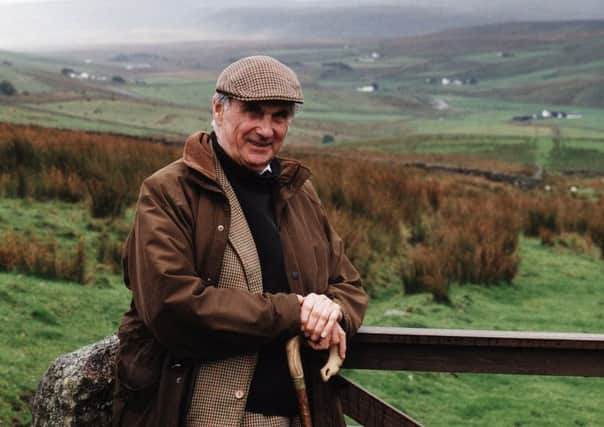Obituary: Harry John Neville Vane, Lord Barnard


Harry John Neville Vane, 11th Baron Barnard and holding the title Lord Barnard, was a leading landowner in County Durham who was deeply involved in agriculture and forestry as well as environmental conservation and tourism. A hereditary peer until the reforms of the House of Lords Act 1999, he presided over the 60,000-acre Raby estate around the village of Staindrop, its centrepiece being the magnificent 14th century Raby Castle where he was born and died. He opened the castle, its grounds and gardens to thousands of tourists every summer.
He had also married into the Scottish nobility through his 1952 wedding to Lady Davina Cecil, granddaughter of John Montagu Douglas Scott, 7th Duke of Buccleuch (and 9th Duke of Queensferry), a former Conservative MP for Roxburghshire and Deputy Lieutenant of Edinburgh.
Advertisement
Hide AdAdvertisement
Hide AdLord Barnard and Lady Davina were divorced in 1992, having had five children, but he retained close ties with Scotland.
He served during the Second World War as a pilot in the RAF Voluntary Reserve, though not in combat, and for 20 years after the war was an officer, latterly a lieutenant-colonel, in the Territorial Army with the Northumberland Hussars. He was also honorary colonel of the 7th (Durham) Battalion of the Light Infantry.
For the last 33 years, he had owned and directed his local newspaper, the Teesdale Mercury, founded in the mid-19th century and billing itself “the Voice of the Dales”. It will now be run by his daughter, Carolyn Vane.
Harry John Neville Vane was born in Raby Castle, the eldest son of Christopher Vane, 10th Baron Barnard, and Sylvia Mary Straker.
He was at Eton College and not quite 16 when war broke out and, owning a motorbike, volunteered as a despatch rider for the Home Guard – “Dad’s Army”. He also cut a dash riding the bike from Eton to Durham during school breaks.
After leaving Eton in 1942, he joined the RAF Voluntary Reserve, receiving his training in South Africa, where he made many life-long friends. After the war, he drove his beloved Bentley through Africa to visit them.
In 1952, he married Lady Davina Cecil, daughter of the 6th Marquess of Exeter and Lady Mary Theresa Montagu Scott, who in turn was daughter of the 7th Duke of Buccleuch. From 1952-61, he was a councillor for County Durham and led the local opposition at a time of pit closures and the rise of a non-working Durham “working class hero” called Andy Capp.
It was in 1964, upon the death of his father, that he became 11th Baron Barnard.
Advertisement
Hide AdAdvertisement
Hide AdAt the time, and until 1970, he was a Justice of the Peace as well as Deputy Lieutenant of County Durham.
A Freemason, he served for almost 30 years as Provincial Grand Master for Durham and held regular fundraising gala days on the Raby estate.
He became deeply involved with the British Red Cross Society and in 1991 was awarded the Queen’s Badge of Honour for exceptional service to the society. He served until his death as an honorary vice-president of the British Red Society and as a patron of the Royal British Legion.
At the ripe age of 63, having been robbed of the chance by the war, Lord Barnard enrolled at Durham University Business School in 1986 and graduated Master of Science.
He was actively involved in many local businesses and community groups, including Teesdale Search and Mountain Rescue Team, the County Durham Scout Association and Durham Wildlife Trust.
For the last 20 years, he served as vice-president of the UK Game & Wildlife Conservation Trust, a cause in which he deeply believed. The charity conducts conservation science, researching and developing game and wildlife management techniques aimed at enhancing the UK countryside for the benefit of the public.
Lord Barnard practised what he preached on his own estate at Raby, encouraging wild game, deer and other wildlife. He also sought to attract song birds, waterfowl and waders to the estate and, for doing so, won the prestigious Laurent-Perrier Wild Game Conservation Award in 1998 and the Grey Partridge Trophy from the Game & Wildlife Conservation Trust in 2011.
A lover of all rural pursuits, he once served as Joint Master of the Foxhounds at the Zetland Hunt, around the Durham/North Yorkshire borders. His maternal grandfather Herbert Straker had served as Joint Master of the same hunt at the turn of the 20th century.
Advertisement
Hide AdAdvertisement
Hide AdLord Barnard devoted his life to being custodian of Raby Castle and estate, conserving his beloved moorland landscape and supporting the local communities of Upper Teesdale. He loved nothing more than to cycle around the estate every evening, feeding his resident ducks, watching his longhorn cattle graze and checking on his herds of red and fallow deer.
Lord Barnard died peacefully in his lifelong home, Raby Castle, surrounded by his family. He is survived by his five children from his former wife Lady Davina. These are his son Henry Francis Cecil, who is now 12th Baron Barnard, and daughters Carolyn, Elizabeth, Sophia and Louise, as well as 11 grandchildren and three great-grandchildren.